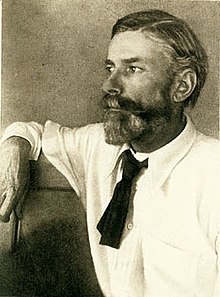
Back إدوارد كاربنتر Arabic ادوارد كاربنتر ARZ Edward Carpenter Welsh Edward Carpenter German Edward Carpenter Esperanto Edward Carpenter Spanish Edward Carpenter Finnish Edward Carpenter French Edward Carpenter ID Edward Carpenter Italian
Edward Carpenter | |
|---|---|
 | |
| Born | Edward Carpenter 29 August 1844 |
| Died | 28 June 1929 (aged 84) |
| Resting place | Mount Cemetery, Guildford, England |
| Occupations | |
| Partner | George Merrill (1891–1928) |
| Signature | |
Edward Carpenter (29 August 1844 – 28 June 1929) was an English utopian socialist, poet, philosopher, anthologist, an early activist for gay rights[1] and prison reform whilst advocating vegetarianism and taking a stance against vivisection.[2][3] As a philosopher, he was particularly known for his publication of Civilisation: Its Cause and Cure. Here, he described civilisation as a form of disease through which human societies pass.[4]
An early advocate of sexual liberation, he had an influence on both D. H. Lawrence[5] and Sri Aurobindo, and inspired E. M. Forster's novel Maurice.[6][7]
- ^ Smith, Warren Allen (2000). "Carpenter, Edward (1844–1929)". Who's Who in Hell, A Handbook and International Directory for Humanists, Freethinkers, Naturalists, Rationalists, and Non-Theists. New York: Barricade Books. p. 186. ISBN 978-1-56980-158-1. OCLC 707072872 – via Internet Archive.
- ^ Rowbotham, Sheila (2008). Edward Carpenter: A Life of Liberty and Love. Verso. p. 310. ISBN 9781844672950.
- ^ O'Neill, Charlotte (7 January 2019). "Edward Carpenter: A Nonhuman Bibliography, by Charlotte O'Neill – Sheffield Animal Studies Research Centre". Sheffield Animal Studies Research Centre. Retrieved 23 October 2019.
- ^ Carpenter, Edward. Civilisation, Its Cause and Cure.
- ^ Delaveny, Emile (1971) D. H. Lawrence and Edward Carpenter: A Study in Edwardian Transition. New York: Taplinger Publishing Company. ISBN 978-0800821807
- ^ Andrew Harvey, ed. (1997). The Essential Gay Mystics.
- ^ Symondson, Kate (25 May 2016) E M Forster’s gay fiction Archived 10 August 2020 at the Wayback Machine. The British Library website. Retrieved 18 July 2020